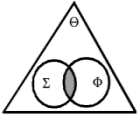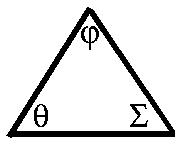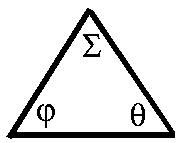Previous . Next
Lecture 14: Catholic Epistemology
Since I was educated in a protestant seminary, I'm not at all able to
explain the last 300 years of the Roman Catholic Church. However, the word
"catholic" means "all-encompassing, general" so one might argue that these
are the views of the majority of Christianity.
Augustine
Saint Augustine was the giant of the early church. Educated in Greek
philosophy, he nonetheless forsook a promising career in philosophy to
pursue religion. His contributions are multiple, not the least of which was
his understanding of knowledge (or "science" for this course).
faith ==> science ==> faith
There is a lot of profound emphases in this little statement.
- It's iterative, cyclic. They build on each other. The whole history of
science might be seen as an unfolding of this cycle. Stanley Jaki argues
that science could only have developed where Christianity had previously
shown the way.
- All the advances of modern physics, biology, computer science, etc,
cannot undermine faith. Think about it a moment. Augustine is saying
that knowledge, say of Darwin's evolution, can only enrich faith. Or that
faith in miracles, such as seeing Jesus walk on the water, only serves to
enhance science.
- This view then, fits neither the separation view [o o], nor the
incorporation views, rather it fits better with the overlapping view
[OO].
Augustine focusses a lot on logic. Neo-Platonism sees the nature of Reality
as embodied in God's word. That is, Nature is not god or a god, but a direct
expression of God. As McGrath puts it, there are only 3 views on nature:
it is divine; it is a product of divinity; it is neither divine nor a
product of divinity. Augustine adopts the middle view, which is most
consistent with the overlapping Venn diagram:
 Jaki argues that this position is the only way that science can avoid the
extreme pitfalls. To the right lies superstition. To the left is chinese
medicine. Only down the center is real science possible. As we have
discussed earlier, one has to hold the reality of the world out-there as
certain, while holding our view of that reality as hypothetical, and subject
to change, in order for science to progress.
Jaki argues that this position is the only way that science can avoid the
extreme pitfalls. To the right lies superstition. To the left is chinese
medicine. Only down the center is real science possible. As we have
discussed earlier, one has to hold the reality of the world out-there as
certain, while holding our view of that reality as hypothetical, and subject
to change, in order for science to progress.
Aquinas 
Medieval scholastics struggled with both understanding faith and science
together. One of the issues that divided them was the tradeoff between
"reason / experience" and "revelation". That is, proofs of God's existence
get you up to only the first stage of Aquinas' two stage world. In the end,
after exhausting all our attempts to understand the universe with our own
abilities, we need the extra-ordinary revelation of God to comprehend the
order. Revelation is required because God is not constrained to be logical,
or perhaps, our finite understanding cannot constrain God.
 This two stage approach can be seen to persist in arguments today, just
replace the Christianity with "Truth" or "Order". For example, in arguments
about "change being inevitable", one should ask why this motto should remain
unchanging.
This two stage approach can be seen to persist in arguments today, just
replace the Christianity with "Truth" or "Order". For example, in arguments
about "change being inevitable", one should ask why this motto should remain
unchanging.
Enlightenment Rationalism
During the Renaissance many took exception to this division. SOme argued
that Reason was king.

This is
what was implied by Descartes famous dictum "Cogito ergo sum." He even
writes a passage in which he divorces knowledge of God from either science
or divine revelation.
This approach to science is highly theoretical, and should you talk to a
theorist, makes perfect sense. Paul Davies book "God and the New Physics"
makes this point exactly--the theory of everything. But what is forgotten is
how often the theorists are wrong! (Sort of like Babe Ruth's record number
of strikeouts.) For example, Kant had an astronomy book that was laughable.
Hegel figured out how many planets there should be based on logic. So in the
end, Reason as king falters for all the same reasons.
Empiricism
As an alternative we have finally empiricism. John Locke's view of the
world.

Here we have much of the lore of the illusive "empirical method",
Observations -> Data -> Hypothesis -> Testing . The problem, of course, is
that very little science follows this pattern. As Thomas Kuhn points out in
his "Structures of Scientific Revolutions", scientific methods do not ever
overturn old theories or create a groundswell for new theories. Rather, they
are a weak support for established theories that amount to a bit of
maintenance. One doesn't build a skyscraper with a dustpan and broom, but
one maintains it with those tools after it has been built.
Last modified, February 18, 2002, RbS
 Jaki argues that this position is the only way that science can avoid the
extreme pitfalls. To the right lies superstition. To the left is chinese
medicine. Only down the center is real science possible. As we have
discussed earlier, one has to hold the reality of the world out-there as
certain, while holding our view of that reality as hypothetical, and subject
to change, in order for science to progress.
Jaki argues that this position is the only way that science can avoid the
extreme pitfalls. To the right lies superstition. To the left is chinese
medicine. Only down the center is real science possible. As we have
discussed earlier, one has to hold the reality of the world out-there as
certain, while holding our view of that reality as hypothetical, and subject
to change, in order for science to progress.  This two stage approach can be seen to persist in arguments today, just
replace the Christianity with "Truth" or "Order". For example, in arguments
about "change being inevitable", one should ask why this motto should remain
unchanging.
This two stage approach can be seen to persist in arguments today, just
replace the Christianity with "Truth" or "Order". For example, in arguments
about "change being inevitable", one should ask why this motto should remain
unchanging.

